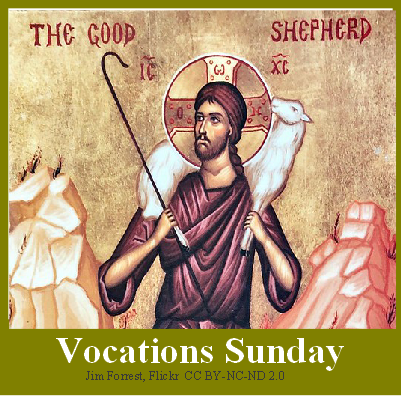8 May 2022
Acts 13:14, 43-52 Apocalypse 7:9,14-17 John 10:27-30
‘My sheep hear my voice; I know them, and they follow me’ (Jn 10:27)
Vocations Sunday
Today, Good Shepherd Sunday, we are invited to reflect on the meaning of God’s call and to pray for vocations to the service of the Church and its mission. To help us reflect on the meaning of vocation – a call to love and serve others – the Church, in today’s Gospel, presents us with the figure of Jesus, the Good Shepherd.
The earliest representations of Jesus date from around the middle of the third century AD. They are to be found on the walls of the catacombs in Rome. They depict Jesus as a young boy with a sheep across his shoulders, clearly symbolizing Jesus, the Good Shepherd. These images were not meant to be portraits of Jesus, but rather symbolic representations that only Christians would understand and appreciate. We must remember that this was at a time when Christianity was a proscribed religion and Christians were being persecuted for their faith. Any form of explicit Christian art was expressly forbidden. This ancient image of Jesus offers us a window into the faith of the early Christians. It shows the profound significance for them of the figure of Jesus as the Good Shepherd.
Our Gospel reading today is taken from St John’s Gospel, chapter 10. It is part of a lengthy discourse in which Jesus speaks of himself as the Good Shepherd, who knows his sheep and cares for them so much that he will lay down his life for them (cf. Jn 10: 1-29). In biblical times there were two kinds of shepherds. There was the hired hand for whom looking after the sheep was no more than a job. He would move from one flock to another depending on the conditions of service, but would never dream of risking his life for the sheep. If he saw wolves or thieves coming, he would flee for dear life and leave the flock to the mercy of the marauders. Then there was the shepherd-owner of the flock who stayed with the same flock all his life. He knew every sheep in his flock individually. When I was a young lad, growing up on a small farm in Cavan (more than 60 years ago), this was the kind of intimate knowledge farmers had of the animals they cared for. The Shepherd owner could call each sheep by name and could tell the life story of each one – when and where it was born, the difficulties it had gone through, its temperament and particular traits. If attacked by wolves or thieves, he would not hesitate to fight to protect his sheep and even risk his life for them.
Jesus is the Good Shepherd par excellence. He knows us, whom he calls ‘my sheep’, intimately, indeed far better than we know ourselves: ‘I know them and they follow me’ (Jn 10:27). In the Jewish culture of Jesus’ day, knowing was not seen as a merely intellectual activity. For Jews, the organ for knowing was the heart. In fact, it is the same knowing that is used to describe the relationship between a husband and wife. Yes, Jesus knows us by heart, that is, with a knowledge that is inseparable from his eternally self-giving love. In John’s gospel, Jesus summarised his mission in one short, heart-warming, sentence: ‘I came that they may have life, and have it abundantly’ (Jn 10:10). And this life is eternal life: ‘I give them eternal life, and they will never be lost’ (Jn 10:28). Jesus fulfilled this mission ultimately by laying down his life for us, his sheep.
This sacrificial dimension of Jesus’ mission is highlighted by John. Four times in his Good Shepherd discourse Jesus states that he freely lays down his life for his followers (cf. Jn 10:11,15,17 and18). In a culture in which leaders ‘made their authority felt’ and insisted on others not only serving them, but doing so obsequiously, Jesus modelled a leadership of loving service without conditions or limits. ‘Having loved those who were his own in the world, he loved them to the end’ (Jn 13:1).To illustrate what it meant to be a ‘Good Shepherd’ and give one’s life in the service of others, he washed his disciples’ feet – the action of a slave! And he expected his followers to emulate his example: ‘I have given you an example, that you should do as I have done to you’ (Jn 13:15).
The Good Shepherd is Pope Francis’ favourite model for priests and all Church leaders. He calls on priests to model themselves on Christ, the Good Shepherd, and to bring the healing power of God’s grace to everyone in need, to stay close to the marginalized, and to be ‘shepherds living with the smell of the sheep’. He contrasts Church leaders who care deeply for those entrusted to their care with those who are just going through the motions, those motivated more by concern for themselves and their privileges than by the needs of those they serve. When people see that their leaders are prepared to pour out their lives in loving and caring service, they, too, will be inspired and empowered to serve one another in love. So we pray:
Jesus, Good Shepherd, as you called your disciples, you call us now.
Open our ears to listen to you calling;
Open our eyes to see you;
Open our hearts to your love.
And loving you, our servant King, let us love and serve one another. Amen
Michael McCabe SMA, May 2022

